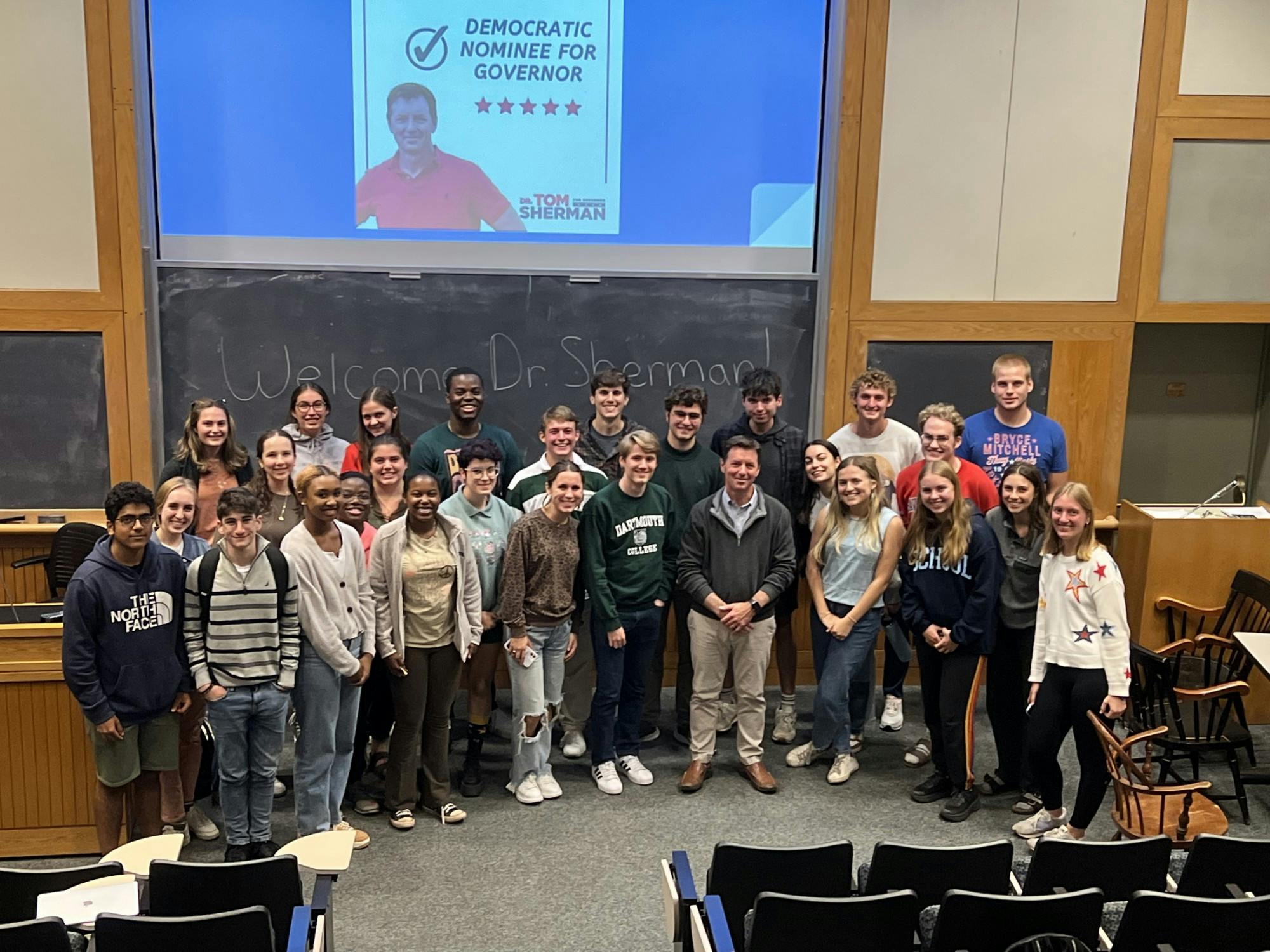Tom Sherman, the Democratic nominee in New Hampshire’s upcoming gubernatorial election on Nov. 8, will face incumbent Republican Governor Chris Sununu, who is running for a fourth two-year term. A state senator for New Hampshire’s 24th district and a licensed gastroenterologist, Sherman sat down with The Dartmouth to discuss the state of his campaign, his Republican opponent and his potential first term in Bridges House — the New Hampshire governor’s mansion.
In the last 100 years, only four challengers have defeated incumbent governors of New Hampshire for reelection. Why is your campaign different?
TS: The reason why it’s so clear Sununu should not be re-elected is because he is not listening to the people of New Hampshire. Think of the issues: Public schools — the core of our communities — are currently under assault by Sununu’s commissioner of education who he has reappointed; on women’s reproductive rights, 60-70% of people in New Hampshire believe that a woman should have the right to choose, and more than that believe that the state has no role in the doctor’s office. Sununu has ignored that and put in place the first abortion ban in New Hampshire’s modern history. At best it was unnecessary, and what it really does is potentially dismantle our network of women’s care across New Hampshire, Vermont and Maine. On costs and the environment — but really costs — Sununu is making it hard for people to meet their monthly bills, and he’s doubling down on it. Sununu has put us in a position where we are almost entirely dependent on fossil fuels for our energy source. And the people who are paying for that are the people and the taxpayers of the Granite State.
Since the Dobbs v. Jackson Women’s Health Organization decision, which overturned the constitutional right to abortion, abortion rights have become one of the key issues of this election cycle. How does your medical background inform your stance on the issue?
TS: My whole background is about not doing harm. It’s actually about helping people. Sununu’s whole background is about doing what’s politically expedient. It’s almost the reverse. For him, it’s politics over people; for me, it’s people over politics. His abortion ban is going to hurt people. My number one goal is to make sure people aren’t getting hurt. I think it’s especially egregious when it’s the policy of the legislature, signed into law by the governor, that’s increasing the pain and the harm. I see what the Republicans are doing. What I understand as a physician — which Sununu can’t understand — is the impact of abortion bans not only on the whole system, but also on the providers and on the patients. As a doctor, I get it. This is what I’ve done my whole career.
The redistricting process in New Hampshire has made it likely that, as governor, you would have to contend with both a Republican-controlled state legislature and executive council. How does that affect your outlook on governing?
TS: I’ve been in the legislature for four terms. In the House, I was in both the minority and the majority. In the Senate, I was in both the minority and the majority. During those sessions, virtually every important bill that I was either putting through or was a part of passed. I understand how to get things done no matter who is in the legislature. What’s different between me and Sununu is that he sits at the end of the process and waits for legislation to come to his desk. I go to the other end. It doesn’t matter who’s in charge or who has the majority; I start at the beginning and make sure we’re focused on solving problems together. If I’m elected alongside a majority-Republican legislature, we’re going to disagree on several things, but we’re still going to get the work of the people done. That starts at the beginning of the process, so I don’t repeat what Sununu did in 2019 and 2020: setting the state record for the number of vetoes in a year.
A significant number of New Hampshire voters are independents. What makes your campaign attractive to swing voters in a historically swing state?
TS: I think New Hampshire is a moderate state. It’s “live free or die.” It’s not about extremes, which is where Sununu has gone. It’s about staying in the middle, solving problems and respecting people’s freedom. And that’s why I’ve always won in a Republican-dominated district. My district is gerrymandered for a Republican, but I’ve won it in both the House and the Senate. That’s because people understand that my whole focus is on solving problems and addressing issues. A really good example is the opioid crisis. Sununu talks about how he’s solved the opioid crisis; he doesn’t have a clue how to solve the opioid crisis. That’s why in Nashua, overdose rates are as high as they were before he took office. That’s why in Manchester our overdose rate is skyrocketing. Sununu doesn’t know how to address that, he doesn’t know how to address mental health and he doesn’t know how to bring in experts to actually help him do it. I do, and that’s what I’ve done in the legislature.
Publicly, Sununu has successfully avoided being branded as a “MAGA Republican”— a quality in today’s Republican Party. How do you move forward when your opponent isn’t as easily defined as their party?
TS: First of all, I think he changed all that last week. On the day of the New Hampshire state primary, Sununu was the person who had called Don Bolduc, the Republican US Senate candidate, a conspiracy theorist. The next day, he was hugging him. Sununu’s now surrounded by MAGA Republicans. Fundamentally, if you have a choice between someone who’s not so bad and somebody who has the demonstrated ability to solve problems, and has done so, why would you choose the not-so-bad? Think of what he’s actually accomplished in the last six years. Tell me what he’s done well — you can’t. I will challenge you on any answer you give. We have numerous crises going on in the state of New Hampshire. We have at least 25 issues that need to be addressed, and Sununu’s had six years to do it.
This interview has been edited and condensed for clarity and length.




